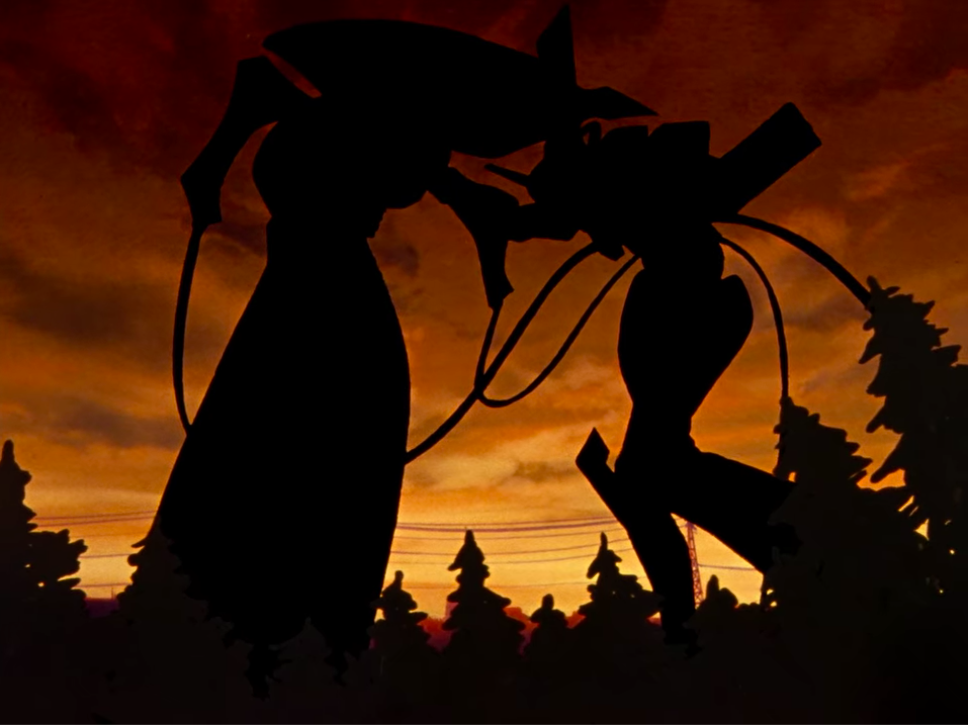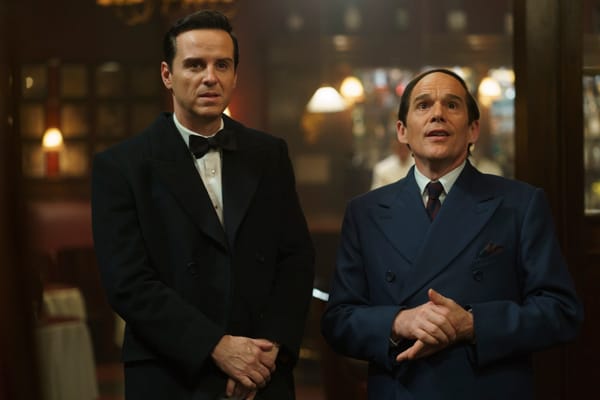The sound of trauma: Neon Genesis Evangelion and escaping your past
Is everybody in this show super depressed, or is it just me?

There is a scene in the third episode of Neon Genesis Evangelion, the groundbreaking 26-episode anime series that aired from 1995 to 1996, that crystallized for me something I have been struggling to explain since I started dealing with the weight of several horrible things lurking in my past.
The shot trucks from left to right, through a boy’s bathroom, focused on the urinals. We hear two boys talking about the ongoing battle with the Angels, gigantic alien beings who threaten all of humanity and who can only be stopped via gigantic robots known as Evangelions. The Evangelions can only be piloted by young teenagers, for reasons that are mostly not explained. (I’m reliably informed that this is a trope.) (Also, I am only eight episodes in. Don’t spoil me.)
What struck me about this scene the first time I watched it wasn’t the shot selection or the dialogue. It was the other sounds. The dripping of a faucet. The slight echo of the space. The dull squeak of shoes every so often. The scene just sounds like a bathroom, in a way that could feel at odds with the topic the boys are discussing. A giant robot vs. alien war is not the sort of thing you’d expect to hear about in so prosaic and everyday a place. And yet here they are.
This environmental approach to sound design is all over Evangelion. I noticed it almost immediately, because working on Arden has given me a better appreciation of the ways sound can be used artistically — but also how easy it can be to so massively privilege non-dialogue that it overwhelms the stuff people need to hear to understand the story. You want to create beautiful soundscapes for the audience; you can’t devote so much time to those soundscapes that they overwhelm everything else.

Yet Evangelion leans more toward these sorts of all-consuming soundscapes than most other films and TV shows. (A sidebar here to note that though I think the mix is handled well enough to understand what characters are saying, I also don’t speak Japanese and read the subtitles. So I don’t actually know that the dialogue is easy to understand.) Director Hideaki Anno drops in a sequence or two in every single episode where whirring cicadas or the rumble of trains underscores a scene or two. Even when two gigantic creatures battle, the camera will sometimes pull back into a wide shot to observe the fight from afar, situated within the natural world. These beings are so large, compared to a human, but they are dwarfed by the immensity of the world itself. Should humanity end, the cicadas will still whir. Water will still drip. Summer will still become fall will still become winter will still become spring.
One of the first things anyone told me about the process of dealing with traumatic memories is that you cannot force yourself to remember more than you already do. The memory is all there, but it will reveal itself to you in time. You have to look at the thing you do remember and be cognizant that everything else is in your peripheral vision. You put this away for a reason, but you also left yourself a reminder of it for a reason. The more you focus on that tiny sliver of what you know, the more it will start to resolve into a larger picture. But the more you force it, the more frustrated you’ll become by your own brain’s attempts to fill in the gaps with things you know aren’t the case. You have to be patient and unflinching, but the thing about trauma is that it makes you panicky. It makes you flinch.
One memory I’ve had my whole life (one that I will not outline in any real detail) began, for me, with a quality of life. I could see the way a single beam of late afternoon light hazily spread through the windows of the living room of the house I grew up in. I could see the individual dust motes there. Obviously, I don’t remember specific dust motes from when I was a child, but they’re there because this is a memory that has been slowed down and elongated. It stands on the precipice of something else, so my brain remembers that moment as being one where time stopped.
Evangelion accomplishes something of the same thing. The events these characters go through are big and raw and traumatic, but they’re also exciting. As viewers, we want to relish in the robot fights without feeling like we’re seeing the characters completely break down. But one of the main points of this show is that placing this kind of responsibility on the shoulders of literal children would make them completely break down. Thus, these moments elongate and slow down. The sound starts to drown everything else out, because even if Shinji doesn’t quite remember fighting an Angel in his Evangelion, he might remember the sound of the cicadas who served as an unwitting audience.
The series I keep thinking of while watching Evangelion is Twin Peaks. David Lynch and Mark Frost’s masterpiece is another show that will exist in the space between moments, in the tiny sensory gaps that exist in the places we don’t really understand but feel intuitively. In both Twin Peaks and his films, Lynch uses the sense of being caught in that in-between to provoke a slow-building horror. In Evangelion, Anno uses the gap to create a kind of doppler-shift depression, a grief you are already past but you can still hear the echoes of.
Both of these series are about gigantic, elemental traumas. Twin Peaks situates itself atop a grand mythology of good and evil playing out in the Pacific Northwest woods, but it’s also about a father who raped his daughter and then killed her. The beauty of its world covers up the horrors that people within it do to each other. When the series gets around to suggesting just what created the horrible evil that infects so much of its world, Lynch and Frost turn to nothing less than the detonation of the atomic bomb.
For its part, Evangelion takes place in a world where the arrival of the Angels and something called the Second Impact killed half of humanity. Cities sit nearly empty or in ruins. Death surrounds everyone. Yet the story here is also about a father who badly mistreats his child, in this case forcing his son into a chosen one narrative the son would rather escape from. Though this trauma is not sexual in nature, it’s not as if it doesn’t exist. Here’s yet another father, forcing a child into something horrible, without that child’s consent.
The traumas of history inform the traumas of our homes. But the inverse of that statement is also true. A good friend of mine recently said to me that trauma creates waves. Something bad happens, and the person it happens to internalizes that bad thing, and then they spread that destruction elsewhere. It takes a lot to be able to stop those waves, especially when you’re just trying to get by in a boat that is buffeted on every side by ever-rising seas.
Evangelion’s use of sound so spoke to me, I think, because it captures the world before something happens. Eventually, you’re going to be sucked back into the story you were always going to be part of. But until then, you’re just in the bathroom or at the pool. You’re just hanging out. The world is dreadfully normal, until it isn’t. And then after a cataclysm, you’re right back to normal again. The world is always ending. It’s also always mending.
But the worst is yet to come, or maybe it’s already behind us. For now, we have all this space, all this time, all this sound. When you think back on that moment, will you remember its particulars, or will you remember how warm the sun felt before it burned you, the prickle of the air on the brink of a storm, the spray off the sea before the plunge?
Talk back at me: Which TV shows or movies best captured the moments between big events? Tell me in comments! (Comments are only available to paid subscribers.)
What I’ve been up to: There’s been some top-notch Emily VanDerWerff content on Vox recently! I recommended the band Fever Dolls, whose music has been a huge balm to me. I also talked up a Star Trek: Deep Space Nine two-parter that seemed to predict the 2020s in eerie fashion.
Robert Hewitt Wolfe, who co-conceived of the story for “Past Tense” (with Ira Steven Behr) and wrote the teleplay for the first installment, pointed out to me in an interview that if there’s one thing these two episodes got desperately wrong about the 2020s, it’s the computers, which woefully lag behind what we have right now. And yet they seem to have anticipated the wealth disparities in Silicon Valley all the same.
Most notably, “Past Tense” reveals an extremely rigid caste system built atop race and class, a real-world problem that has taken on incredible urgency in recent years. Yet the impetus for its story, according to Wolfe, was the large unhoused population in Santa Monica, California, more than two decades ago.
“We weren’t being predictive. We were just looking out our windows in the ’90s,” Wolfe says. “My wife worked with homeless and mentally ill people as a psychotherapist. Ira [Steven Behr] said what convinced him to do the episodes was walking through Palisades Park in Santa Monica and seeing all the homeless people there. They’re still there. It hasn’t changed. We weren’t being predictive. We were just being observant.”
Read me: My old coworker and good friend Kelsey McKinney had a terrific piece about just how thoroughly the debacle with the winter storm in Texas has exposed the hollowness of our politicians’ rhetoric. Also, I’m a little bit in awe of the URL.
My little sister sent me a photo of the faucet in her Dallas house, which she had left on at a drip overnight at the instruction of a half-dozen Instagram suggestions from people who know how to weather the cold. This, they said, is to keep your pipes from freezing, to keep the water running so it doesn’t solidify in the freezing temperatures and explode. We don’t know about that. We are Texas girls, after all, raised in winters warm enough to swim in the pool on Christmas, with bodies capable of regulating 110 degrees but not 30. You can get used to the heat, gain a tolerance for it, learn to run a mile through air that feels like you’re breathing through a straw, but you can’t get used to the cold. The cold will kill you. When my sister woke up the next day, her faucet was an icicle. It was cold enough inside her bathroom to freeze the water solid as it dripped.
Watch me: Because this is my newsletter, and you have to pretend to be into the same stupid crap as me, I think you should watch this “documentary” about the search for Noah’s Ark from 1993, which haunted my every waking thought for a while when I was a kid.
And another thing… I know absolutely nothing about “4Kids” and what they apparently did to anime when importing it to America, but this parody of what a 4Kids opening to Evangelion might have looked like still makes me laugh a lot.
A thing I had to look up: I can genuinely never remember that a shot that moves from left to right is called a “truck” shot. I always, always, always have to look it up, and this happens far, far too often.
This week’s reading music: “The Steps” by HAIM
Episodes is published three times per week. Mondays feature my thoughts on assorted topics. Wednesdays offer pop culture thoughts from freelance writers. Fridays are TV recaps written by myself. The Wednesday and Friday editions are only available to subscribers. Suggest topics for future installments via email or on Twitter. Read more of my work at Vox.




